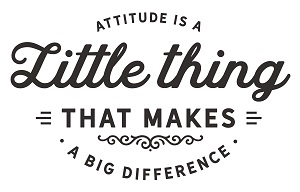Attitudes at work can positively or negatively affect our behavior. There are many ways to keep up a positive attitude at work, especially when it comes to safety.

Our day-to-day attitude makes a difference in how we engage with our work. Attitude affects behavior and the attitude you choose could save (or cost you) your life.
How to Maintain a Positive Attitude at Work
Workers with a positive attitude are more likely to be engaged and keep safety a priority. Those with a negative attitude are more likely to cause conflict, stress, and unsafe behaviors that could cause an injury or incident.
There are plenty of actions you can take to keep up a positive attitude at work, especially when it comes to safety.
- Practice active listening during compliance training and remain engaged during safety meetings. Ask questions, in a respectful manner, about any procedure or precaution that isn’t clear.
- Take personal responsibility for your own safety and the safety of your co-workers. Fix or report safety hazards while following the proper reporting procedure.
- Cooperate with safety inspections and monitoring. Propose safety improvements to management.
- Set a good example for others, especially newer employees. Don’t skip safety steps, even during routine procedures. Encourage co-workers to follow the safety rules.

Why a Negative Attitude at Work Can Be Dangerous
A negative attitude at work can lead to carelessness, poor judgement, complacency, insufficient risk assessment, and a tendency to take shortcuts, all of which can put yourself and others at risk.
Nothing on earth can stop the person with the right attitude from achieving their goal; nothin on earth can help the person with the wrong attitude. - Thomas Jefferson
When strong emotions come up, it’s important to recognize what is happening, and take a break (or encourage someone else to take a break) if it might help.
Emotions are part of our human nature, and not everyone will be happy all the time, but if the emotions become overwhelming, workers can become distracted, and workplace safety will be compromised.
If something at work, or in your personal life, is affecting you in a way that is becoming profoundly distracting, then please speak to your manager, or someone you trust at work, to get the time off, or help, that you need.

Hazardous Attitudes at Work
There’s more to having a negative attitude than just being in a bad mood. There are different types of common attitudes that can be dangerous at work. Here are six types of hazardous attitudes:
Anti-Authority Attitude
People who have a strong aversion to being told what to do may have an anti-authority attitude. When someone feels resentful or angry that someone is “bossing them around”, they may make rash decisions that affect the safety of the team. Speaking up and asking questions to promote safety and improve productivity is great, but it’s important to do so in a positive manner with the goal of seeking solutions.
Impulsive Attitude
An impulsive attitude causes quick reactions without pausing to consider the outcome first. In rare circumstances, fast responses are essential to a life-saving outcome, but in most situations at work, taking a moment to consider your actions is the key to safety. It’s better to take some time to plan your next steps, than risk injury because of a rash decision.
Invincible Attitude
Those who feel they have mastered the job may seem to have an invincible attitude at work. Workers who behave as if they will never get hurt may increase their risk by taking unnecessary chances more often. Acting with confidence on the job is valued but being assured with your actions at work should also be balanced with focus, awareness, and caution.
Macho Attitude
When confidence exceeds ability, a macho attitude can become dangerous, especially when someone repeatedly tries to prove they are better than others. Taking risks to impress others, and refusing to ask for help when needed, can backfire when it results in injury or lost productivity. Understandably, workers want to demonstrate that they are pulling their weight, but it’s important to acknowledge your limitations and rely on teamwork when it’s the best way to get the job done.
Defeatist Attitude
A defeatist attitude occurs when workers feel like they have no control over what happens at work and safety is only a matter of luck. Feeling helpless, workers can be complacent and overlook obvious risks or give up when faced with demanding situations that require confident decision-making skills. If you reach a point in your job where the overwhelming feeling is, “What’s the point, nothing I do makes a difference” then it’s time speak up before this attitude causes serious harm at work.
Disgruntled Attitude
If a worker generally feels unhappy at work, they may demonstrate a disgruntled attitude and express their dissatisfaction by complaining excessively. Workers may feel annoyed or frustrated by things that happen at work, but constant grumbling without taking action will begin to alienate co-workers. Behaving in a professional manner is the first step towards enacting the change you think should happen at work. Start a dialogue about what’s important to you but also be willing to listen.

Take Responsibility for Your Own Attitude
You are responsible for your attitude at work. No one else is responsible for your behavior, except you, so take ownership.
- Recognize when you are developing a negative or hazardous attitude. You may be in a bad mood, everyone is getting on your nerves, rules may seem pointless and arbitrary, or you may just feel angry at the world.
- Identify specifically what is really bothering you. Maybe personal issues at home are starting your day off on the wrong foot or you didn’t get enough sleep. Are co-workers behaving in a way that is aggravating to you or is something else troubling you in way that you just can’t ignore.
- Address the issues directly. This isn’t always easy and can’t always be handled quickly, but if the issue is within your power to control, you can take action, and if it’s not something you can change, then you do have power over your thoughts and attitude.
- Monitor your attitude and do a daily self-check if that helps. If you recognize that certain people or activities push you to a negative frame of mind, then be proactive to reduce those interactions in your life as much as you can.
Everyone has bad days from time to time, but it’s important to see how a negative attitude can have dangerous safety implications if you aren’t careful.
Look out for your co-workers too! If you notice someone having a rough day, give them space, see if you can help, make sure they are continuing to work safely, and provide them a bit of grace as they get through their day. Your positive attitude may be just what they need to turn their day around.

.jpg)

.jpeg)